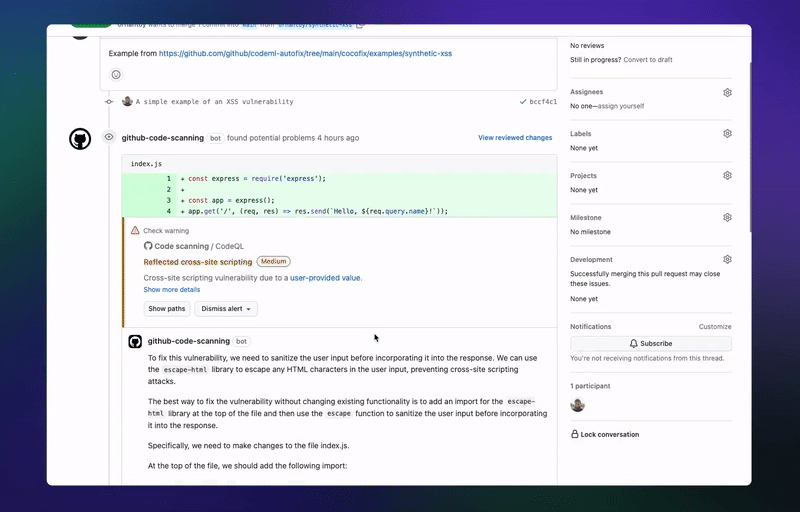Table of Contents
Introducing GitHub’s latest AI tool Autofix Feature: Revolutionizing Production Code Debugging
It’s a momentous day for developers worldwide as GitHub’s latest AI tool, the renowned software development platform, unveils its latest innovation: the AI Autofix feature. Just hours after Sentry’s announcement of its own AI debugging tool, GitHub is now stepping into the spotlight with its code-scanning auto-fix feature designed to detect and remedy security vulnerabilities in real-time during the coding process.
GitHub’s Code-Scanning Autofix Feature: Redefining Security Practices
GitHub’s latest AI tool code-scanning auto-fix feature marks a significant advancement in security practices within the software development lifecycle. By combining the real-time capabilities of GitHub’s Copilot with CodeQL, the company’s semantic code analysis engine, developers gain unprecedented power to identify and address vulnerabilities seamlessly as they write code.

Unveiling GitHub’s Beta: Empowering Development Teams
In a move that promises to streamline development workflows and bolster security measures, GitHub’s latest AI tool is rolling out the beta version of its code-scanning autofix feature. This powerful tool is set to transform the way development teams approach vulnerability remediation, enabling them to fix more than two-thirds of identified vulnerabilities automatically, often without manual code editing.
GitHub’s Promise: Efficiency and Coverage in Vulnerability Remediation
GitHub pledges that its code-scanning auto-fix feature will cover over 90% of alert types in supported languages, including JavaScript, Typescript, Java, and Python. With a commitment to efficiency and comprehensive coverage, GitHub aims to empower developers and security teams alike to safeguard their codebases effectively.
Enhancing Development Efficiency and Security
“GitHub Copilot relieves developers of tedious and repetitive tasks,” GitHub asserts in its announcement. With the introduction of code scanning autofix, development teams stand to benefit from newfound efficiencies, reclaiming valuable time previously spent on manual remediation efforts. Moreover, security teams can focus on strategic initiatives to protect their organizations while keeping pace with accelerated development cycles.

The Technology Behind GitHub’s Innovation
At the core of this groundbreaking feature lies GitHub’s CodeQL engine, a sophisticated semantic analysis tool capable of identifying vulnerabilities in code preemptively. Leveraging a combination of heuristics and GitHub Copilot APIs, the system suggests fixes seamlessly, minimizing manual intervention. GitHub further enhances the auto-fix feature by utilizing OpenAI’s GPT-4 model to generate fixes and explanations, ensuring accuracy and clarity in remediation efforts.
GitHub’s Confidence and Transparency
While GitHub expresses confidence in the accuracy of its auto-fix suggestions, the company remains transparent about the limitations of the system. Acknowledging that a small percentage of suggested fixes may stem from misunderstandings of the codebase or the vulnerability, GitHub underscores the importance of human oversight in the remediation process.
Conclusion: A Paradigm Shift in Software Development
GitHub’s newest AI tool signifies a pivotal moment in software development and security protocols. It transcends mere technological progress, signaling a paradigm shift in industry norms. By endowing developers with automated remediation abilities and proactive vulnerability detection, GitHub’s latest AI tool is charting a course toward a future where code embodies both efficiency and inherent security.
This advancement fosters an environment where development teams can readily embrace automation and intelligence, unlocking boundless opportunities for innovation and risk management. As the landscape evolves, GitHub’s tool not only streamlines processes but also fosters a culture of resilience and adaptability, ensuring that software remains robust and safeguarded against emerging threats.





